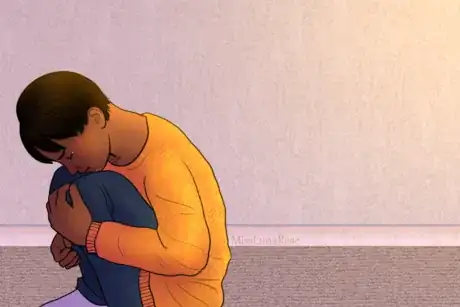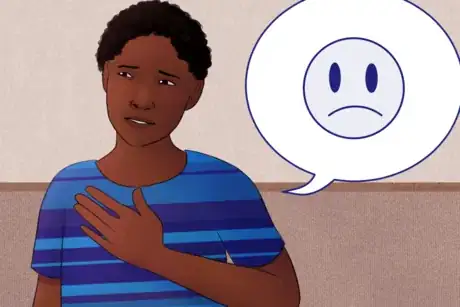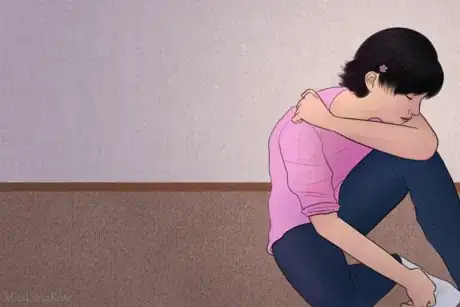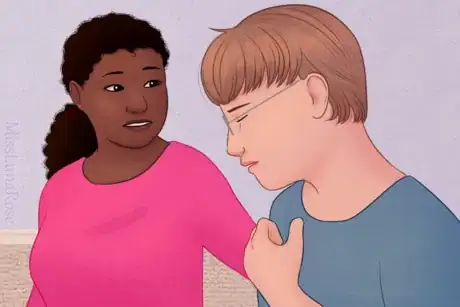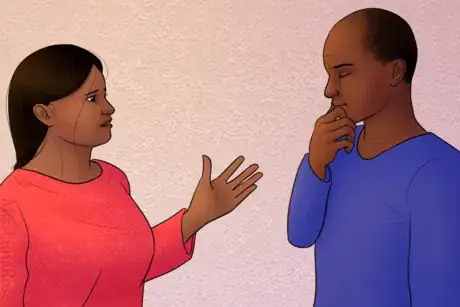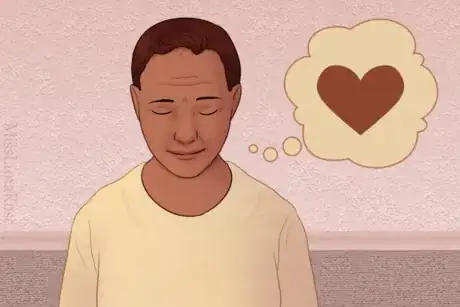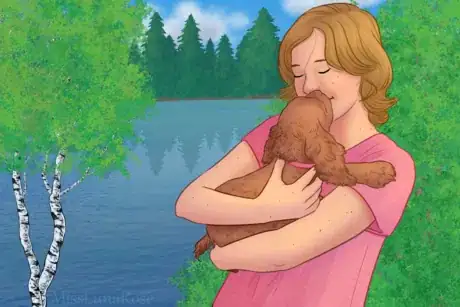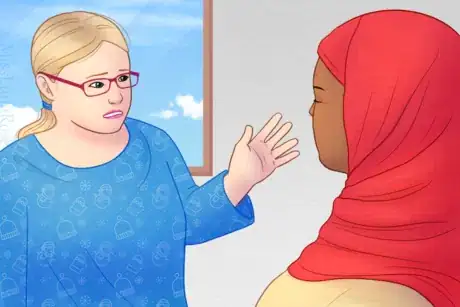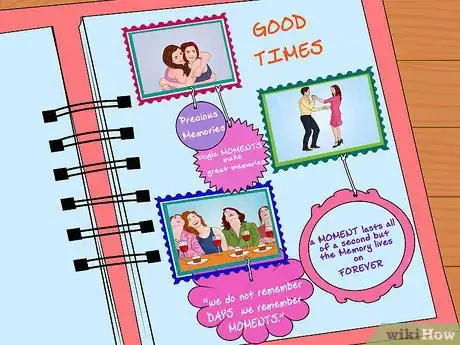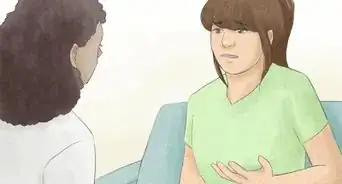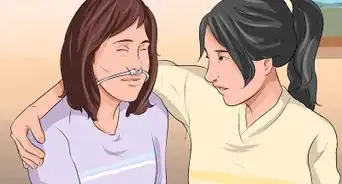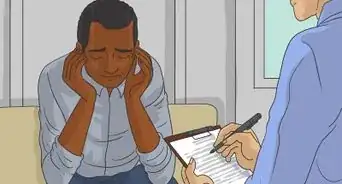This article was co-authored by Ken Breniman, LCSW, C-IAYT and by wikiHow staff writer, Christopher M. Osborne, PhD. Ken Breniman is a Licensed Clinical Social Worker, Certified Yoga Therapist and Thanatologist based in the San Francisco Bay Area. Ken has over 15 years experience of providing clinical support and community workshops utilizing a dynamic combination of traditional psychotherapy and yoga therapy. He specializes in eclectic non-denominational yoga guidance, grief therapy, complex trauma recovery and mindful mortal skills development. He has a MSW from Washington University in St. Louis and an MA Certification in Thanatology from Marian University of Fond du Lac. He became certified with the International Association of Yoga Therapists after completing his 500 training hours at Yoga Tree in San Francisco and Ananda Seva Mission in Santa Rosa, CA.
There are 8 references cited in this article, which can be found at the bottom of the page.
wikiHow marks an article as reader-approved once it receives enough positive feedback. In this case, several readers have written to tell us that this article was helpful to them, earning it our reader-approved status.
This article has been viewed 274,094 times.
The loss of a family member is probably one of the hardest emotional experiences we ever have to endure. The death of a brother or sister comes with its own unique set of thoughts and feelings. It can be a confusing and distressing at times, no matter what your age. How is the best way to cope with such an event?
Steps
Accepting Your Feelings
-
1Accept there is no 'right' or 'wrong' way to deal with this. You may feel numb or in disbelief for some time. You may feel like you should feel sadder. You may feel like you couldn't ever feel sadder than this. You may want to scream and shout. You may want to lock yourself away alone. All of these are normal feelings and it's perfectly okay to feel this way.[1] Do not put pressure on yourself to feel a certain way.[2]
-
2Talk about how you feel. Keep talking about how you are feeling as much as possible. It may not always be easy to put into words but try to explain to others around you how you are feeling. Close friends and family will want to help you as much as possible but won't always know how, so telling them how you feel and how you need them to act around you will help them to figure out how best to help you. [3]Advertisement
-
3Be aware you may need time to yourself. Whilst it is good to keep talking to others as much as possible, you may also need some time to yourself to process your own thoughts and feelings. This is perfectly fine. You may find that going to a particular place helps you to focus your thoughts--this may be a place that was special to your sibling, your sibling's resting place, a quiet park, or even your own room.
- You may also find writing down your thoughts and feelings helps you to get things a little more straight in your mind.[4]
-
4Remember you are not the only person grieving. Other siblings, your parents, cousins, grandparents, friends, aunts and uncles will all be touched by your sibling's death in different ways. Remember this and treat their wishes and emotions with the same respect you want yours to be treated. You may get asked a lot how your parents are coping, and this may seem hurtful and disrespectful if it feels like people are ignoring your feelings over that of your parents.
-
5Specifically ask not for pity. Sympathetic glances every once in a while are okay, but most people who have just been through such an ordeal don't appreciate pity like most people mistakenly think they do. If you make it clear right away, people will try to avoid doing something to displease you, especially at a time of suffering.
- Don't bring up your sibling's death casually. Whenever you are talking with someone, don't act unusually or bring up the topic. This results in pity, which is something you likely do not want. Keep in mind that talking about a sibling's death with others can also make you emotional.
-
6Forgive yourself for not being the perfect sibling. You might find yourself wondering, "Why did I start so many stupid fights?" or, "How come I couldn't let go of that stupid grudge?" It's natural to wonder why you didn't make better use of the time you had together after the death of someone close. It's also beneficial to forgive yourself for your all-too-human flaws. [5]
- Try to remember the good and kind ways you treated your sibling instead of regretting bad ways you treated them.
-
7Practice self-care. Grieving the loss of a loved one is both emotionally and physically draining. You may lose your appetite, be unable to sleep, or fall into unhealthy habits in the hope of feeling a little better. Because physical and emotional health are intertwined, make time to support both. [6]
- Concentrate on eating a healthy diet. If you've lost your appetite, try to eat frequent, healthy snacks and drink lots of water.
- Maintain a consistent sleep schedule and create a welcoming sleep environment to help you get more quality rest.
- Make time to maintain your previous level of physical activity, or even begin an exercise program that may be beneficial to you.
- Avoid unhealthy, temporary "fixes" such as excessive alcohol consumption, illicit drug use, self harm, eating unhealthy foods, or engaging in risky behaviors. You'll probably find that talking about your feelings with someone is far more effective.
Going Forward
-
1Communicate openly, honestly, and frequently with other family members. Each of you had a unique relationship with the deceased and will deal with grief in your own unique way. Having said that, the deceased's other loved ones are best suited to understand what you're going through as a result of this particular loss. Share your emotions and listen to others compassionately and without judgment.
- These people are likely just trying to help and may not feel comfortable asking you directly how you are feeling. But always remember that your emotions, and your ways of grieving and coping, are just as valid as anybody else's.
Expert AnswerQHow do you help someone else deal with a death in the family?
Ken Breniman is a Licensed Clinical Social Worker, Certified Yoga Therapist and Thanatologist based in the San Francisco Bay Area. Ken has over 15 years experience of providing clinical support and community workshops utilizing a dynamic combination of traditional psychotherapy and yoga therapy. He specializes in eclectic non-denominational yoga guidance, grief therapy, complex trauma recovery and mindful mortal skills development. He has a MSW from Washington University in St. Louis and an MA Certification in Thanatology from Marian University of Fond du Lac. He became certified with the International Association of Yoga Therapists after completing his 500 training hours at Yoga Tree in San Francisco and Ananda Seva Mission in Santa Rosa, CA.Licensed Clinical Social Worker & Certified Yoga Therapist
 EXPERT ADVICEAnswer from Ken Breniman, LCSW, C-IAYT:
EXPERT ADVICEAnswer from Ken Breniman, LCSW, C-IAYT:The only thing you can do is be there for them. You can't process their feelings for them, and mourning is an extremely personal process. Offer to be with them or talk about whatever they'd like, but don't force yourself into their grieving process. If they want to be alone, let them be. There's only so much you're going to be able to do.
-
2Create mementos or items to celebrate and remember your sibling. This could include getting involved with their funeral arrangements by helping to pick the songs or readings. You may even want to read something out yourself. You may not feel up to contributing to the ceremony much and it may only be later on that you feel you can start remembering your sibling without it seeming too painful.
- There are lots of ideas for items you can make to help you keep their memory alive; scrapbooks, memory boxes, photo albums, poetry, playlists. The more personal they are, the better they will be for you when you want to spend some time remembering your sibling and the good times you had together.[7]
- You may also find spending time doing projects with other members of your family can help you cope-- these projects may be totally unrelated to your brother or sister but can help give you something else to focus on whilst still in an environment where you are still surrounded by other people who know what you are going through.[8]
- Make a personal memorial of your sibling. This could be a website, blog, scrapbook, or photo album. Any medium that will honor your sibling and keep your late sibling in your heart constantly.[9] Find ways to share their memories and celebrate their life.[10]
-
3Look for counseling or professional help. This is a serious event to happen in your life and there is no shame in seeking outside help. There is lots of support out there and many people find comfort in speaking to people outside of their friends and family. From group meetings to one-on-one sessions, telephone lines and internet forums, there are plenty of places to go to if you feel you need to.[11] Your doctor will be able to point in the best direction.[12]
Expert Q&A
-
QuestionHow can I celebrate my sister's life?
 Ken Breniman, LCSW, C-IAYTKen Breniman is a Licensed Clinical Social Worker, Certified Yoga Therapist and Thanatologist based in the San Francisco Bay Area. Ken has over 15 years experience of providing clinical support and community workshops utilizing a dynamic combination of traditional psychotherapy and yoga therapy. He specializes in eclectic non-denominational yoga guidance, grief therapy, complex trauma recovery and mindful mortal skills development. He has a MSW from Washington University in St. Louis and an MA Certification in Thanatology from Marian University of Fond du Lac. He became certified with the International Association of Yoga Therapists after completing his 500 training hours at Yoga Tree in San Francisco and Ananda Seva Mission in Santa Rosa, CA.
Ken Breniman, LCSW, C-IAYTKen Breniman is a Licensed Clinical Social Worker, Certified Yoga Therapist and Thanatologist based in the San Francisco Bay Area. Ken has over 15 years experience of providing clinical support and community workshops utilizing a dynamic combination of traditional psychotherapy and yoga therapy. He specializes in eclectic non-denominational yoga guidance, grief therapy, complex trauma recovery and mindful mortal skills development. He has a MSW from Washington University in St. Louis and an MA Certification in Thanatology from Marian University of Fond du Lac. He became certified with the International Association of Yoga Therapists after completing his 500 training hours at Yoga Tree in San Francisco and Ananda Seva Mission in Santa Rosa, CA.
Licensed Clinical Social Worker & Certified Yoga Therapist Try to choose something that your sister loved doing with you and try sharing that with others. So, if your sister really enjoyed a certain movie, throw a viewing party and invite your friends to watch it together. Another thing you can do is build a scrapbook or write her a letter. Really, anything you do to remember her and keep her memory alive is going to be a great way to celebrate her.
Try to choose something that your sister loved doing with you and try sharing that with others. So, if your sister really enjoyed a certain movie, throw a viewing party and invite your friends to watch it together. Another thing you can do is build a scrapbook or write her a letter. Really, anything you do to remember her and keep her memory alive is going to be a great way to celebrate her. -
QuestionWho should I talk to if I'm having trouble coping?
 Ken Breniman, LCSW, C-IAYTKen Breniman is a Licensed Clinical Social Worker, Certified Yoga Therapist and Thanatologist based in the San Francisco Bay Area. Ken has over 15 years experience of providing clinical support and community workshops utilizing a dynamic combination of traditional psychotherapy and yoga therapy. He specializes in eclectic non-denominational yoga guidance, grief therapy, complex trauma recovery and mindful mortal skills development. He has a MSW from Washington University in St. Louis and an MA Certification in Thanatology from Marian University of Fond du Lac. He became certified with the International Association of Yoga Therapists after completing his 500 training hours at Yoga Tree in San Francisco and Ananda Seva Mission in Santa Rosa, CA.
Ken Breniman, LCSW, C-IAYTKen Breniman is a Licensed Clinical Social Worker, Certified Yoga Therapist and Thanatologist based in the San Francisco Bay Area. Ken has over 15 years experience of providing clinical support and community workshops utilizing a dynamic combination of traditional psychotherapy and yoga therapy. He specializes in eclectic non-denominational yoga guidance, grief therapy, complex trauma recovery and mindful mortal skills development. He has a MSW from Washington University in St. Louis and an MA Certification in Thanatology from Marian University of Fond du Lac. He became certified with the International Association of Yoga Therapists after completing his 500 training hours at Yoga Tree in San Francisco and Ananda Seva Mission in Santa Rosa, CA.
Licensed Clinical Social Worker & Certified Yoga Therapist Reach out for help. See a grief counselor, therapist, or just go talk to a friend and ask for help. You can also seek out a support group near you. Remember, there's nothing wrong with getting help if you need it.
Reach out for help. See a grief counselor, therapist, or just go talk to a friend and ask for help. You can also seek out a support group near you. Remember, there's nothing wrong with getting help if you need it.
Warnings
- Such a major loss can lead to depressive and suicidal thoughts. This is not abnormal, but make sure you seek professional help from your doctor straight away if you do start suffering from these.[16]⧼thumbs_response⧽
References
- ↑ Ken Breniman, LCSW, C-IAYT. Licensed Clinical Social Worker. Expert Interview. 24 April 2020.
- ↑ http://www.mentalhealthamerica.net/conditions/coping-loss-bereavement-and-grief
- ↑ http://www.mentalhealthamerica.net/conditions/coping-loss-bereavement-and-grief
- ↑ https://caps.ucsc.edu/pdf/what-you-need-during-grief.pdf
- ↑ https://www.cancer.net/coping-with-cancer/managing-emotions/grief-and-loss/grieving-loss-sibling
- ↑ https://www.cancer.net/coping-with-cancer/managing-emotions/grief-and-loss/grieving-loss-sibling
- ↑ Ken Breniman, LCSW, C-IAYT. Licensed Clinical Social Worker. Expert Interview. 24 April 2020.
- ↑ https://www.cancer.net/coping-with-cancer/managing-emotions/grief-and-loss/grieving-loss-sibling
- ↑ http://www.washington.edu/counseling/resources-for-students/healthy-grieving/
- ↑ https://www.cancer.net/coping-with-cancer/managing-emotions/grief-and-loss/grieving-loss-sibling
- ↑ Ken Breniman, LCSW, C-IAYT. Licensed Clinical Social Worker. Expert Interview. 24 April 2020.
- ↑ https://www.psychguides.com/guides/how-to-find-help-treating-a-grief-management-problem/
- ↑ http://www.mentalhealthamerica.net/conditions/coping-loss-bereavement-and-grief
- ↑ https://www.cancer.net/coping-with-cancer/managing-emotions/grief-and-loss/coping-with-grief
- ↑ http://www.mentalhealthamerica.net/conditions/coping-loss-bereavement-and-grief
- ↑ https://www.nhs.uk/conditions/stress-anxiety-depression/coping-with-bereavement/
